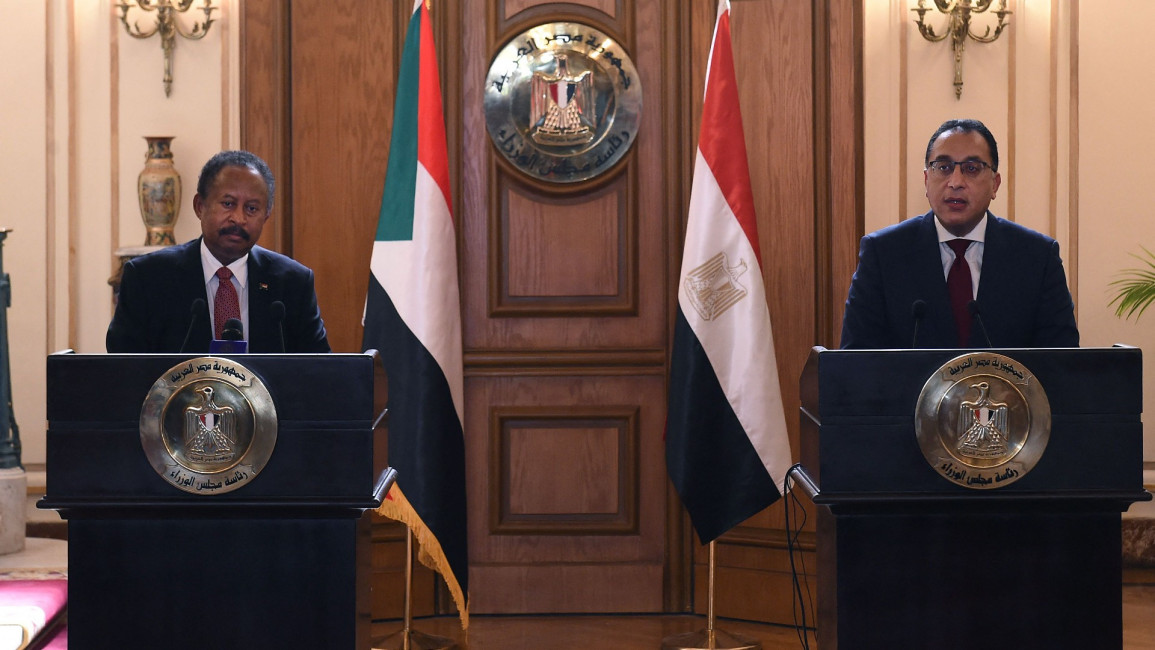Sudan PM Hamdok in Cairo to discuss Ethiopia's Nile dam dispute
Sudan's prime minister held talks with the Egyptian president in Cairo on Thursday as both nations seek to build a united front in the ongoing dispute over the controversial dam that Ethiopia is building on the Blue Nile.
Prime Minister Abdalla Hamdok and President Abdel Fattah el-Sissi agreed that both governments should “work closely at this critical moment" until they mobilise international and regional players to help mediate a solution to the water dispute with Ethiopia, according to a statement by the Egyptian presidency.
The dispute centers on the Grand Ethiopia Renaissance Dam and how much water Ethiopia will release downstream if a multi-year drought occurs and how the three countries would settle any future disputes. Egypt and Sudan also call for a legally binding agreement on the dam’s filling and operation, while Ethiopia insists on guidelines.
Despite years-long negotiations, the countries have failed to reach a three-way deal.
Karthoum has recently called for internationalizing the dispute to include the U.S., the European Union, the U.N. and the African Union to facilitate reaching an agreement on the filling and the operation of Ethiopia's massive dam.
Sudan wants Ethiopia to coordinate and share data on the dam’s operation to avoid flooding and protect its own power-generating dams on the Blue Nile, the main tributary of the Nile River. The Blue Nile meets with the White Nile in Khartoum. From there, the Nile winds northward through Egypt and flows into the Mediterranean Sea.
Egypt, the Arab world’s most populous country with over 100 million people, has called the dam an existential threat and worries that it would reduce its share of Nile waters. The country relies almost entirely on the Nile to supply water for agriculture and its people.
About 85% of the Nile’s flow originates from Ethiopia. Ethiopian officials hope the dam, now more than three-quarters complete, will reach full power-generating capacity in 2023, helping pull millions of its people out of poverty.
“We are concerned about Ethiopia’s intention to move forward with the filling of the dam for the second consecutive year without coordinating with the two downstream countries,” said Egypt’s Prime Minister Mustafa Madbouly in a joint news conference with Hamdok.
In recent weeks, Cairo and Khartoum criticized Ethiopia’s plans to start a second filling of the dam’s reservoir during the next rainy season, expected in July.
“This leaves us with very little time to handle the situation,” said Hamdok. “However, we are hopeful that by then we can reach an agreement on how the filling can take place."
Hamdok’s visit came less than a week after el-Sissi’s had been in Khartoum in his first visit to the neighboring country since the popular uprising that led to the Sudanese military’s overthrow of longtime autocrat Omar al-Bashir in April 2019.
Egypt has in recent years sought to rebuild ties with its southern neighbor, an effort that has intensified since al-Bashir’s ouster. Top civilian and military officials from both nations have exchanged regular visits. Earlier this month, both countries signed an agreement to strengthen military cooperation.
At their news conference, both premiers said they discussed several economic projects that foster cooperation between their countries in areas such as electricity, transportation, agriculture and irrigation.
Follow us on Facebook, Twitter and Instagram to stay connected



